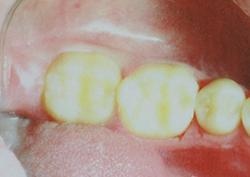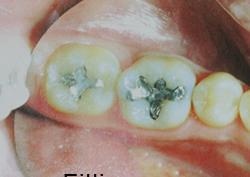 There are multiple reasons for sensitive teeth, the most common reason being your gums have slightly receded. This recession of the gum line allows the underlying dentin to show through which allows water and food easier access to the sensitive nerve. To manage this, there are a number of toothpastes and gels that can be applied to the area and even some dental procedures that can be performed. We can find the right products and solution for your personal situation.
There are multiple reasons for sensitive teeth, the most common reason being your gums have slightly receded. This recession of the gum line allows the underlying dentin to show through which allows water and food easier access to the sensitive nerve. To manage this, there are a number of toothpastes and gels that can be applied to the area and even some dental procedures that can be performed. We can find the right products and solution for your personal situation.
Healthy teeth and gums start at home. Brushing twice a day and flossing at least once daily is very important and should be added to your daily to-do list, Brushing, flossing, and getting routine cleanings with your hygienist every 6 months is the best way to take care of your teeth and gums on a regular basis. This continuous routine for caring for your oral health will greatly minimize the risk of gingivitis or tooth decay as you age.
Gingivitis is a common and mild form of gum disease (periodontal disease) that causes irritation, redness and swelling (inflammation) of your gums
Periodontitis (per-e-o-don-TIE-tis) is a serious gum infection that damages the soft tissue and destroys the bone that supports your teeth. Periodontitis can cause tooth loss or worse, an increased risk of heart attack or stroke and other serious health problems.
Periodontal Disease is a chronic condition that needs immediate attention. Through a series of Periodontal Cleanings, Root Planing & Scaling, Laser Therapy and Local Antibiotics, this condition can be controlled. Periodontal Surgery is only necessary for severe cases. Learn more about gum disease treatment.
SILVER (MERCURY) FILLINGS, known as Amalgam have been around for decades. Made from a metal alloy, it was the best restoration for fillings. The metal expands and contracts with the heat and cold placed in the mouth. This allowed for little bacteria to enter a tooth once filled; keeping the tooth healthy and strong.
WHITE (TOOTH COLORED) FILLINGS, also known as composite fillings, are often made of plastic or glass polymers. These cosmetic fillings allow us to fill a cavity with a substance that will look and feel just like your existing tooth structure. This restoration is created with a resin material and fits tightly into a tooth to prevent decay. Rather than a gray or silver material in your mouth, the composite color will match your natural tooth color.


As parents and health care professionals, we strive to do our very best for your child’s teeth and his/her total health. Our goal is to provide the very best care for your child using the most recent and up to date technology and research (Evidence Based Studies). You may be aware that there is a lot controversy and on going debate over the use of amalgam in dentistry.
Amalgam fillings contain a varying percentages of liquid mercury. The debate rages over the questionable properties of liquid mercury, a known toxic substance. The ADA states that amalgam is safe to use in both children and adults. While in different countries, placing mercury filling is banned.
In our practice we opt to place the tooth colored fillings due to their superior functional and cosmetic properties, leaving any controversy out.
There are several ways in today’s Dental technology to enhance your smile. Certain procedures include:
We have the capability to improve your smile using all or some of these procedures. For a personal consultation, please contact our office so that we may provide you with a customized treatment plan.
Tooth Whitening is a cost effective and safe procedure to create a beautiful, healthy smile. Over the years, fluoride has been added to the whitening product. This reduces the risk of tooth and gum sensitivity.
Tooth Whitening must be monitored by your dentist and only done after a comprehensive exam and hygiene cleaning.
The whitening process can last for a number of years if maintained properly. Beverages such as coffee, tea, cola and wine will reduce the lasting effect. Remember, if it could stain a white shirt, it will stain your smile!
Bonding is a cost effective procedure used to fill gaps in front teeth and to change a tooth’s color. The immediate results are amazing. Within a few hours, you will have a great smile! Bonding like Tooth Whitening may change color over time due to coffee, tea, cola and wine.
Porcelain Veneers are thin pieces of porcelain that go directly on your natural teeth. . This entire procedure can take as few as two visits. Veneers change the size, shape and color of a patient’s teeth. This procedure is used to repair fractured teeth, teeth darkened by age or medication, or a crooked smile. Many times, patients ask for Porcelain Veneers to simply feel and look younger with a straighter, whiter smile!
Crowns are a permanent cosmetic procedure that covers the entire tooth. It will change the size, shape and color of the teeth in as few as 2 visits.
A Dental Implant is a “man-made” replacement for a missing tooth or tooth root. Made from titanium, this screw-like object is inserted under the gum and directly into the upper or lower jaw bone. There is usually minimal discomfort involved with this procedure. After a period of a few months, the Dental Implant and the bone fuse together. This creates an anchor for the new tooth to be placed onto the dental implant.
With major advancements in Dentistry and Dental Implants, most people are candidates for Dental Implants. There may be exceptions due to chronic illness, heart disease and severe osteoporosis.
The average Dental Implant Procedure takes 3 – 4 visits. The first visit is to x-ray the area and take an impression for a surgical guide and a temporary prosthesis to cover the Implant.
The next visit is to place the Implant. A local anesthesia is applied to the area. Any additional sedation is no longer necessary unless deemed by the dentist. The dentist will then make a minor incision to place the implant. The implant is placed into the jaw bone. The area will then be covered with sutures. The procedure is usually completed with minor pain.
You will next return in approximately 3 months to begin creating the Porcelain Crown to place over the Implant.
With routine dental hygiene scheduled and proper home care, A Dental Implant can last approximately 30 years to a lifetime.